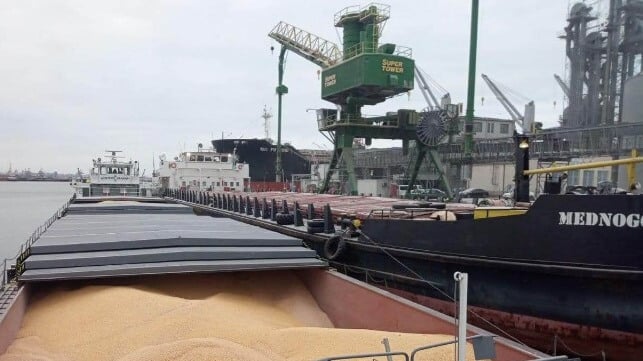Success of Ukraine’s Black Sea Corridor Puts Danube Back in Second Place
Challenges and Resilience of Ukraine's Danube Shipping

The Ukrainian Danube Shipping Company (UDP) plays a crucial role in the country’s export strategy. It serves as a vital backup route for transporting goods from inland ports to Constanta and the Black Sea. Before the war, the Danube was not a primary choice for Ukrainian shipping. However, with the recent resumption of deepwater grain terminals near Odesa, UDP has found itself in a challenging position. The river has become a secondary option for agricultural exporters, who now face higher costs and numerous obstacles. Despite these challenges, UDP remains a strategic alternative in uncertain times.
Resilience Amidst Adversity
In a recent New Year’s message, UDP CEO Dmytro Moskalenko reflected on the difficulties faced by the company and the industry as a whole. He stated, “The year 2024 will be remembered by the Danube as a time of testing resilience and endurance.” The ongoing crisis has forced many Danube shipping companies to freeze investments and halt repairs. Many crews are working at loss-making rates, unable to repay loans, which has resulted in significant losses for the fleet. Despite these hardships, UDP has made a conscious effort to adapt to the new realities of the shipping landscape.
One of the company’s key strategies has been to ensure timely payments to its seafarers. By refusing to operate routes at a loss, UDP has managed to maintain a minimum level of profitability for each trip. Additionally, the company has continued its investment program focused on renewing its fleet and improving shoreside infrastructure. Moskalenko emphasized the importance of these capital investments, stating they are essential for a sustainable future. The introduction of UDP’s first modern bulker marks a significant milestone, showcasing the company’s commitment to progress and efficiency.
Facing Regulatory and Financial Hurdles
Despite its efforts, UDP faces significant challenges due to its status as a state-owned enterprise. Moskalenko pointed out that many costs are beyond the control of the company’s commercial managers. These include maintaining non-operational vessels, managing unused real estate that incurs high taxes, and shouldering a substantial social burden that private shipping companies do not face. Furthermore, UDP has received limited state support to develop its routes, which adds to its financial strain.
ABS Grants Approval in Principle to SHI for Cyber Resilience
Looking ahead, Moskalenko expressed hope for the future, stating, “We do not lose hope that next year 2025, we will be able to get rid of at least some of the negative factors.” The company is also concerned about the fate of transport routes connecting Ukraine’s agricultural regions to Danube ports, particularly Ismail and Reni. A proposed 40 percent increase in rail tariffs by the state rail company Ukrzaliznytsia could significantly raise transport costs, making the Danube less competitive compared to deep-sea ports around Odesa. UDP has appealed to the Ukrainian cabinet to reject this tariff hike, emphasizing that such an increase could cripple the route to Constanta.
Deputy Director General Vladislav Belah highlighted the potential consequences of the tariff increase, stating that if UDP receives support, it could guarantee a monthly freight flow of 1.2 to 1.5 million tons per year. This would ensure continued exports, even in the face of military risks and potential blockades at seaports. As the war continues, the need for a resilient and adaptable shipping strategy remains critical for Ukraine’s agricultural exporters.
